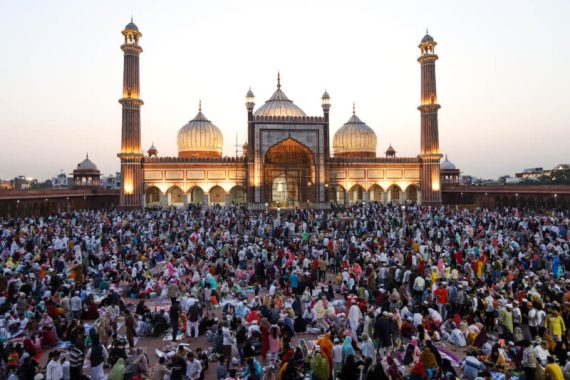F
or many Indian Muslims, the Gujarat riots are among some of their darkest memories. However, this year, millions of Indian history textbooks will erase the plight endured by Muslims at the hands of Hindu nationalists in 2002.
India’s state-run National Council of Educational Research and Training (NCERT) has prescribed new changes to history textbooks, removing chapters that write about the Gujarat riots.
The removed sections also include the assassination of Mohandas K. Gandhi by Nathuram Godse of the Rashtriya Swayamsevak Sangh (RSS), an Indian right-wing, Hindu nationalist volunteer paramilitary organization. Paragraphs on the ban on the RSS after the assassination of Gandhi have also been removed from textbooks.
The RSS shares ideological links with the ruling Bharatiya Janata Party (BJP) of Indian Prime Minister Narendra Modi.
The changes will apply to thousands of Central Board of Secondary Education (CBSE) schools following the NCERT syllabus.
With tens of millions of students, more than 24,000 schools are affiliated with India’s CBSE and use NCERT textbooks. In addition, around 240 CBSE-affiliated schools operate in 26 countries across the world.
Erasing “Muslim history”
Among the deleted sections is an entire chapter on Mughal rulers, whom Hindu nationalists have often addressed as Muslim oppressors.
Mughals and other Muslim dynasties ruled many parts of India for hundreds of years and have made significant contributions to the country’s rich culture.
BJP leader Kapil Mishra applauded the changes calling it “a great decision to remove the false history of Mughals.” He added, “Thieves, pickpockets and two-penny road raiders were called the Mughal Sultanate and the emperor of India. Akbar, Babar, Shahjahan, Aurangzeb are not in the history books, they are in the dustbin.”
In addition, all references to the Gujarat riots that rocked Modi’s state of Gujarat in 2002, leaving 1,000 people dead, mostly Muslims, were omitted from textbooks.
India is home to more than 200 million Muslims, the second-largest religion in the country. In fact, India is the country with the third-largest Muslim population in the world. The Indian government has always been at the center of criticism for pursuing a Hindu nationalist agenda and oppressing the Muslim population.
Since the BJP came to power in 2014, the Indian government has attempted to revise textbooks three times with the previous textbook revisions taking place in 2017 and 2019. Interestingly, in the past, India’s BJP government has also changed Muslim-sounding names of places and cities.
In fact, the BJP has previously expressed its desire to rewrite the country’s history. “It is our responsibility to write our history,” said Indian home affairs minister Amit Shah in a 2019 speech.
Recommended
Rationalization exercises?
As the chapter deletions got widely criticized, NCERT justified the re-edited books as a “rationalization” project aiming to reduce the curriculum load on students.
“There has been a lot of learning loss due to the COVID pandemic and the students underwent a lot of traumas. To help stressed students, and as a responsibility to society and the nation, it was felt that the content load in textbooks should be reduced,” Dinesh Prasad Saklani, director of the NCERT, told NDTV.
However, many historians and opposition leaders have criticized the NCERT’s deletions and called them an attempt to rewrite history.
A joint statement by more than 250 historians in India read, “The decision of the NCERT is guided by divisive motives. It is a decision which goes against the constitutional ethos and composite culture of the Indian subcontinent. As such, it must be rescinded at the earliest.”
It remains to be seen how omitting key moments in Indian history will distort the understanding of history for younger generations in India and across the world. What is certain, however, is that the weaponization of the past and attempts to change history to build a society that is ideologically compliant with BJP nationalism has become the new reality of Modi’s India.





